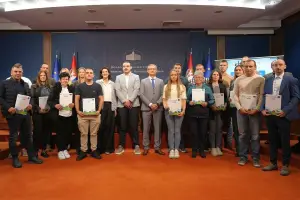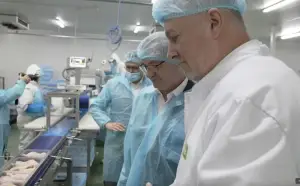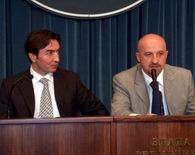- Serbia
Get to know Serbia
- Citizens
Culture and science
Health services
Pension and disability insurance
- Business
Employment
Economy
- Media
- Government
- Contact
Keep in touch
Contact form
Back
Keepin touch
Whether you have a question, comment, suggestion or any problem in the purview of the government, send us your message and we will try to respond as soon as possible. If your problem is not in our purview, we will forward your message to the relevant institution.
Q:
A:
Proposal of measures for export promotion presented
Belgrade,
20 May 2004
Serbian Minister of International Economic Relations Predrag Bubalo and Deputy Minister Ljubisa Jovanovic have presented a proposal of measures to improve exports this year, with the aim to create conditions for export growth through a changed structure of domestic products meant for sales in foreign markets, which, along with attracting foreign investment, is one of the Serbian government’s top priorities.
Bubalo told a press conference that foreign trade deficit represents one of the main problems in domestic economy, and he explained that this proposal, though not designed to remove all the problems, represents a move forward given that it introduces measures which did not exist in the past.
Deputy Minister Ljubisa Jovanovic said that the sluggish production, lack of goods intended for foreign markets, unchanged structure of products for exports, inadequate regulations, poor quality control system, inefficient banking sector, and poor transport infrastructure have been the main characteristics of Serbian exports so far.
According to him, this has resulted in too high costs of shipping of goods abroad and, as an end result, a low competitiveness of Serbian goods in foreign markets.
Jovanovic added that the solution lies in systemic measures, which include export-oriented agricultural, industrial, and trade policies, the adoption of related budgets, preparation of regulations and standards in line with the European Union and World Trade Organisation (WTO) rules, and the defining of competencies of ministries with the aim to boost exports and raise the efficiency of state administration, particularly the customs services.
As systemic measures, Jovanovic also mentioned adequate subsidies for strategic agricultural products meant for exports, the regulation of quality standards, and procedures for issuing certificates, as well as defining of all forms of non-tariff measures in accordance with the WTO regulations, the creation of clusters on the national level, and modernization of transport.
Jovanovic also said it is necessary to raise the efficiency of the banking sector when it comes to financing the production of goods and services meant for exports and also to promote and speed up the opening of the Fund for insurance and financing of foreign trade deals and the Serbian Guarantee Fund. It is also necessary, according to Jovanovic, to create and advertise domestic brands intended for sales abroad and adopt a national policy with measures to encourage the development of new brands and technologies.
He explained that structural measures include efforts to attract foreign direct investment, promote production cooperation and joint ventures and to boost the volume of agricultural and industrial production and encourage the services sector. He also named Russia, China, and the EU as chief target markets for Serbian exporters in the future. He said that the promotion of small and medium sized business in Serbia should result in a total of 400,000 small and medium sized enterprises in five years from now.
Deputy Minister Ljubisa Jovanovic said that the sluggish production, lack of goods intended for foreign markets, unchanged structure of products for exports, inadequate regulations, poor quality control system, inefficient banking sector, and poor transport infrastructure have been the main characteristics of Serbian exports so far.
According to him, this has resulted in too high costs of shipping of goods abroad and, as an end result, a low competitiveness of Serbian goods in foreign markets.
Jovanovic added that the solution lies in systemic measures, which include export-oriented agricultural, industrial, and trade policies, the adoption of related budgets, preparation of regulations and standards in line with the European Union and World Trade Organisation (WTO) rules, and the defining of competencies of ministries with the aim to boost exports and raise the efficiency of state administration, particularly the customs services.
As systemic measures, Jovanovic also mentioned adequate subsidies for strategic agricultural products meant for exports, the regulation of quality standards, and procedures for issuing certificates, as well as defining of all forms of non-tariff measures in accordance with the WTO regulations, the creation of clusters on the national level, and modernization of transport.
Jovanovic also said it is necessary to raise the efficiency of the banking sector when it comes to financing the production of goods and services meant for exports and also to promote and speed up the opening of the Fund for insurance and financing of foreign trade deals and the Serbian Guarantee Fund. It is also necessary, according to Jovanovic, to create and advertise domestic brands intended for sales abroad and adopt a national policy with measures to encourage the development of new brands and technologies.
He explained that structural measures include efforts to attract foreign direct investment, promote production cooperation and joint ventures and to boost the volume of agricultural and industrial production and encourage the services sector. He also named Russia, China, and the EU as chief target markets for Serbian exporters in the future. He said that the promotion of small and medium sized business in Serbia should result in a total of 400,000 small and medium sized enterprises in five years from now.
-
 Belgrade, 27 October 2025
Belgrade, 27 October 2025Construction of Selova dam of vital importance for southeast Serbia
-
 Belgrade, 22 October 2025
Belgrade, 22 October 2025First 19 resolutions awarded under IPARD III for procurement of new tractors
-
 Šid, 21 October 2025
Šid, 21 October 2025Superior Foods example of successful Serbia-Hungary cooperation
-
 Belgrade/Washington, 17 October 2025
Belgrade/Washington, 17 October 2025Confirmation of Serbia’s position as attractive investment destination
-
 Belgrade/Washington, 16 October 2025
Belgrade/Washington, 16 October 2025Serbian economy maintains stability amid global challenges
-
 Sombor, 14 October 2025
Sombor, 14 October 2025Agriculture one of major pillars of bilateral cooperation with Italy
-
 Belgrade, 13 October 2025
Belgrade, 13 October 2025First IPARD III resolutions on support to farmers presented
-
 Belgrade, 21 September 2025
Belgrade, 21 September 2025Solution for legalisation of 4.8 million properties by year’s end
-
 Belgrade, 19 September 2025
Belgrade, 19 September 2025Strong potential for Italian investments in Serbia’s processing sector
-
 Belgrade, 17 September 2025
Belgrade, 17 September 2025Serbia committed to building strong economic ties with Russia


